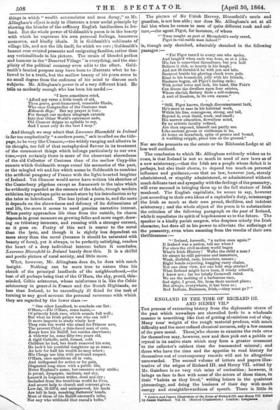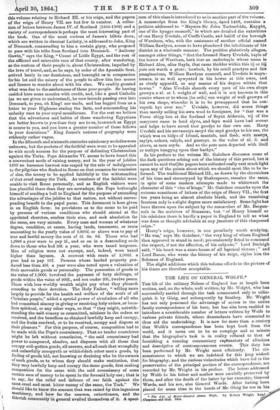ENGLAND IN THE TIME OF RICHARD III.
AND HENRY VII.*
THE process of extracting history from the diplomatic stores of the past which nowadays are shovelled forth in a wholesale manner is something like that of getting aluminium out of clay. Many tons' weight of the rough material produce, with much difficulty and the most refined chemical tortures, only a few ounces of the pure metal. Those:who choose to examine the rude ores for themselves may, however, now and then pick out a pebble or crystal in its native state which may form a greater ornament to the collector's cabinet than the transmuted mineral ; and those who have the time and the appetite to read history for themselves out of contemporary records will not be altogether unrewarded. The second volume of letters and papers illus- trative of the reigns of Richard III. and Henry VIL edited by Mr. Gairdner is no very rich mine of curiosities ; however, it brings us face to face with some of the actors of those times, in their "habits as they lived," writing letters in the quaintest phraseology, and doing the business of their day with much energy aud straightforwardness of speech. There is little in
• Letters and Papers Illustrative of the Reign of Richard III. and Henry VII. Edited by James Gardner. Vol. IL (Record Commission.) London: Longmans.
this volume relating to Richard III. or his reign, and the papers of the reign of Henry VII. are but few in number. A collec- tion of letters between James IV. of Scotland (1505-1509) and a variety of correspondents is perhaps the most interesting part of the book. One of the most curious of James's billets doux, which are written in classical Latinity, is addressed to John, King of Denmark, commending to him a certain gipsy, who proposed to pass with his tribe from Scotland into Denmark. "Anthony Gawin," says the King, "Count of Little Egypt, and the rest of the afflicted and miserable race of that county, after wandering, as the custom of their people is, about Christendom, impelled by
the love of travel, and, as he says, by order of the Apostolic Seat, arrived lately in our dominions, and besought us in compassion for his lot and the misery of the people to allow him free access and licence to wander about with his clan. We readily granted what was due to the misfortunes of these poor people. So having resided here some months with credit, and, like a good Catholic (as we are given to understand), he now intends passing over into Denmark, to you, oh King! our uncle, and has begged from us a letter to your Highness stating the facts, and commending his unlucky race to your royal munificence. For the rest we believe that the adventures and habits of these wandering Egyptians are better known to you than they are to us, inasmuch as Egypt is nearer to you, and you have a greater number of these fellows in your dominions." King James's notions of geography were evidently rather vague.
In the fifteenth and sixteenth centuries missionary societies were unknown, but the pockets of the faithful were wont to be appealed to with much success for the purpose of defending Christendom against the Turks. Pope Alexander VI. seems to have found this a convenient mode of raising money, and in the year of jubilee 1500 an immense harvest was reaped by the sale of indulgences to the pilgrims who flocked to Rome on that occasion for remission of sins, the money to be applied faithfully to the withstanding of that cruel enemy the Turk. As numbers of the faithful were unable to visit Rome personally, and as English visitors were less plentiful there than they are nowadays, the Pope bethought himself of sending a bull to England for the purpose of extending the advantages of the jubilee to that nation, not without corres- ponding benefit to the papal purse. This document is here given in an English form; its provisions as to the sums to be paid by persons of various conditions who should attend at the appointed churches, confess their sins, and seek absolution for the same, are very minute. Every man and woman of whatever degree, condition, or estate, having lands, tenements, or rents amounting to the yearly value of 2,000/. or above was to pay of true and lawful money the sum of 3/. Os. 8d. Those who had 1,000/ a year were to pay 21., and so on in a descending scale down to those who had 201. a year, who were taxed tenpence. Men of religion were not exempt, and, indeed, were taxed higher than laymen. A convent with rents of 2,000/. a year had to pay 10/. Persons whose landed property pro- duced less than 40/. a year were also taxed upon a valuation of their moveable goods or personalty. The possession of goods to the value of 1,0001. involved the payment of forty shillings, of goods within the value of 200/., and not under 20/., twelve pence. Those with less worldly wealth might pay what they pleased, according to their devotion. The Holy Father, "willing more largely to provide for the health and welfare of the souls of all Christian people," added a special power of absolution of all who had committed simony in giving or receiving holy orders, or bene- fices spiritual, or any other ways, so that "they might, notwith- standing the said simony so committed, minister in the orders so received, and the benefices so obtained lawfully keep and occupy, and the fruits received, or to be received, occupy and dispose at their pleasure." For this purpose, of course, composition had to be made with the Pope's commissary. That no tender conscience might be left without consolation, "the said commissary had power to compound, absolve, and dispense with all those that occupy evil-gotten goods, all usurers, and all such that wrongfully and unlawfully occupyeth or withholdeth other men's goods, by finding of goods hid, not knowing or doubting who be the owners of such goods, or to whom they should make restitution, that they may lawfully keep and occupy the dame goods, first making composition for the same with the said commissary of some certain sum of money to be spent in the foresaid holy use ; that is to say, for the relief and defence of our faith against the most cruel and most bitter enemy of the same, the Turk." We should like to know the amount that was raised by this ingenious machinery, and how far the usurers, extortioners, and the thievish community in general availed themselves of it. A sped- men of this class is introduced to us in another part of the volume. A manuscript from the King's library, dated 1408, contains a petition addressed to " Maystre Sir John Turburfelde, Knyght, one of the kyngys examen," in which are detailed the extortions of one Harry Uvedale, of Corffe Castle, and bailiff of the borough of Wareham, who, with the assistance of another official named William Rawlyns, seems.to have plundered the inhabitants of his district in a wholesale manner. The petition plaintively alleges, amongst other things, "that the foresaid Harry Uvedale, bayle of the borow of Wareham, hath ther an underbayle whose name is Richard Alen, alias Bayle, that came thidder within this iij or iiij yere not wurth a grote ; howbeit, by his sotell practyse and We ymaginacions, William Rewlyne councell, and Uvedale is mayn- tenans, is as well apwynted in his howse at We owre, and as clenly appardd, as any manse of his degree within that towne." "Also Uvedale shereth every yere of his own shepe growyn a xl. or 1. weight of wull, and it is not knowen in this mitre where or to whom [he sells] one weight of wall growyn of his own shepe, wherefor it is to be presupposed that he con- veyeth hyt over see." Uvedale, however, did worse things than merely selling his own wool to foreigners, for "ther was a Frens shipp lost at the foreland of Seynt Aldernis, vii of the maryners came to land alyve, and fayn wuld have had soot= and helpe to have saved ther goodys to ther own use. Harry Uvedale and his servauntys savyd the seyd goodys to his use, the which was ox hidys of bland, mantels, and flesh, with mastys, saylys, ankers, cabyls, and guernys, to the value of xl. li. and above, as men seyde. And so the pore men departed with litell or nothyn bangyng upon ther backys."
In his preface to the volume Mr. Gairdner discusses some of the dark questions arising out of the history of this period, but it cannot be said that:the papers here collected really cast much light upon any of the points about which we should most like to be in- formed. The traditional Richard III., as drawn by the chroniclers of his time and stereotyped by Shakespeare, remains the same, in spite of some modern attempts made to whitewash the character of this "vice of kings." Mr. Gairdner remarks upon the extreme scantiness of letters of the reign of Henry VII., the first ten years being an almost absolute blank, and the remaining fourteen only in a slight degree more satisfactory. Some light has been thrown upon the subject by the researches of Mr. Bergen- roth in the archives of Simancas, but "of Henry himself or his ministers there is hardly a paper in England to tell us what was done or thought advisable it any juncture of this chequered reign."
Henry's reign, however, is one peculiarly worth studying. "He was," says Mr. Gairdner, "the very king of whom England then appeared to stand in need; pre-eminently fitted to command the respect, if not the affection, of his subjects." Lord Burleigh said, "his heart was a store-house of all hqroical virtues ; " and Lord Bacon, who wrote the history of his reign, styles him the Solomon of England.
The slight additions which this volume affords to the picture of his times are therefore acceptable.



































 Previous page
Previous page